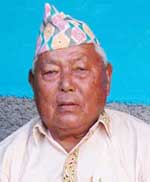
 Dhana Lal Gurung was captured by the Japanese in 1941 while he was fighting for the British in Malaya. Taken to a prisoner of war camp in Singapore, he spent four years breaking rocks, carrying sacks of salt and enduring immense hardship.
Dhana Lal Gurung was captured by the Japanese in 1941 while he was fighting for the British in Malaya. Taken to a prisoner of war camp in Singapore, he spent four years breaking rocks, carrying sacks of salt and enduring immense hardship.
After the war, Dhana Lal and 3,000 other Nepali Gurkhas were released, emaciated and sick. Some returned home to their families in Nepal, while other rejoined the British or Indian armies to keep fighting in other wars.
"It was bad enough to have suffered in the POW camps," says a still-sprightly 86-year-old Dhana Lal, "but when we found that that the white prisoners received much more compensation than us, that really hurt."
After a protracted legal battle, the British government agreed last November to provide ex-gratia payment of ?10,000 for the 100 or so surviving ex-Gurkha servicemen who were imprisoned by the Japanese. The defence had argued that the exclusion of the Gurkhas in the reparation with the Japanese after the war was racist. A team at the Far East Prisoner of War (FEPOW) office in Kathmandu had started processing applications from ex-prisoners in April and travelled across Nepal interviewing Dhana Lal and others to verify their claims. So far, a few city-based prisoners like Dhana Lal have received their money, which amounts to nearly Rs 1,400,000.
"I am old now, the money will make it easier for me to die in peace. I have been paid for shedding my blood," says Dhana Lal, who had been depending on his daughter's salary to buy medicine. Dhana Lal has used his money to pay debts and buy a house for his daughter in Lamachaur in Pokhara.
84-year-old Pahalman Gurung was also imprisoned in Singapore and he is all praise for the Gurkha Army Ex-Servicemen's Organisation (GAESO) for getting the compensation. "We never imagined it would happen. The British government was forced to agree," says Pahalman, went to London to testify at the hearings and has now distributed the money equally among his sons. Now he is hoping that the ex-British Gurkhas will also get a pension on par with their white colleagues. Equal pension has been one of the other demands from the Gurkhas and it is in the British courts.
Both Pahalman and Dhana Lal have memories of ill-treatment in the camps, of severe beatings and double work as punishment. There were some 13,000 prisoners in Singapore, Ipo and Kuala Lumpur, most of them British, Sikhs, Pathans and Nepalis. Rations were meagre and many prisoners didn't make it. There were three battalions of nearly 3,500 Gurkhas in Malaya at that time. Some were killed in the Japanese advance, but severely outnumbered, most surrendered. At the end of the war in August 1945, the Japanese released the prisoners and the British just sent them home. Most of the white British soldiers were given compensation as far back as 1952. The Gukhas were regarded as Indians and weren't given money. After pressure from activists and ex-Gurkhas, the British Government announced in November 2003 that, following on from the 2000 Ex-Gratia Payment Scheme for Far East Prisoners of War and Civilian Internees, Gurkhas who were soldiers with the old Indian Army during the Second World War, would, if they were Nepali citizens in 1951, qualify for the ?10,000 compensation.
At the end of the war in August 1945, the Japanese released the prisoners and the British just sent them home. Most of the white British soldiers were given compensation as far back as 1952. The Gukhas were regarded as Indians and weren't given money. After pressure from activists and ex-Gurkhas, the British Government announced in November 2003 that, following on from the 2000 Ex-Gratia Payment Scheme for Far East Prisoners of War and Civilian Internees, Gurkhas who were soldiers with the old Indian Army during the Second World War, would, if they were Nepali citizens in 1951, qualify for the ?10,000 compensation.
The scheme was then formally extended to include those who were held captive by the Japanese in the Second World War and who, were citizens of Nepal in 1951 when the Peace Treaty was signed between the Allied Powers, including the United Kingdom and Japan.
It is not yet clear what will happen to the compensation for those ex-prisoners who have died since their release, although GAESO says it is trying to get the compensation amount to the families of the deceased. "We are collecting data. They are scattered across Sikkim, Dehradun, Darjeeling, and we have about 1,000 ex-prisoners still living," says Padam Bahadur Gurung of GAESO.
Some 50,000 Nepali soldiers fought and died for the allies in both world wars. The death toll represents a shocking 10 percent of Nepal's able-bodied male population in the early and mid-20th century. More died fighting Maoists in Malaya and Indonesians in Borneo in the late 1950s. More than 100,000 came back invalid and spent the rest of their lives unable to work in their villages across the mountains of Nepal.
Dambar Ghale remembers his father, Dallu, coming home in 1945. "He fought for six years for the British. He came back wounded, and we have taken care of him all our lives," he says. For people like Pahalman and Dhana Lal, justice has been served very late in their lives. But for others, all that remains are memories of bravery for a cause most can't remember, or even if they do, doubt if it was worth dying for.


